More than 150 mass vaccination centres could CLOSE next month as shortages force under-50s to wait for first doses – but Matt Hancock claims jabs had already saved than 6,000 lives by March and SAGE claims hospital admissions will HALVE in April
- Vaccine centres in Devon, Cornwall and Kent among those to have confirm they will ‘have to pause’ in April
- Health Secretary claimed No10 research found vaccination spared more than 6,000 lives end of February
- He said the success of the rollout meant he could ‘see an end’ to the crisis for the first time in the pandemic
- Forecasts by No10’s scientists said Covid admissions to English hospitals poised to halve in next fortnight
Mass coronavirus vaccination sites across the UK have announced they will close temporarily next month due to looming supply issues – as Matt Hancock revealed the jabs have saved at least 6,000 lives already in the UK.
Vaccine centres in Devon, Cornwall and Kent are among those to have confirmed they will ‘have to pause’ during the month-long slowdown, which has been triggered by a shortfall of five million AstraZeneca jabs from India. If the rest of the country follows suit, it could see all 150 mass vaccination sites shut.
The focus of the rollout will turn to ensuring there are sufficient vaccine stocks to dish out crucial second doses, with staff at mass hubs around the country expected to be redeployed.
Local vaccination centres have also been told to close unfilled bookings from March 31, with the supply constraint expected to last throughout April. The NHS has called on over-50s to book their first vaccine appointment while they still can before Monday, or risk facing delays.
GPs will continue contacting eligible patients on their lists, but some vaccination sites including Westpoint, near Exeter, have revealed they will shut between April 1 and 11. All of Kent’s five mass vaccination centres, for example, are set to close ‘for a number of weeks’ from next month.
The pause in Britain’s vaccine drive will mean that fewer Britons are vaccinated when No10 starts to reopen the economy on April 12 – but ministers have insisted the timetable will not be affected despite predictions of an ‘exit wave’ of Covid cases as society opens up.
Meanwhile, Mr Hancock today claimed new Government-backed research had found vaccination spared more than 6,000 lives by the end of February. He said the rollout’s success meant he could ‘see an end’ to the crisis.
His comments to the Financial Times came as forecasts by No10’s scientists suggested the number of Covid patients being admitted to English hospitals is poised to halve in a fortnight, from 294 to fewer than 150.
The projections from the SPI-M modelling group also projected the number of deaths to drop fourfold, from 92 to 20, early next month and the level of inpatients with the disease to plummet from 4,000 to about 2,000.
The promising calculations, which have been presented to ministers, were made after children returned to classrooms this month, The Times reports. There were fears that reopening schools could trigger a wave of infections.
SPI-M’s modelling assumes that vaccinations will continue at current levels. More than 450,000 Brits are being jabbed every day, but there are fears that supply issues next month could drastically slow the scheme down.
Government data up to March 23 shows 28,653,523 people have received a first vaccine dose, a rise of 325,650 on the previous day. Both AstraZeneca and Pfizer’s vaccines have been shown to cut deaths and hospitalisations by more than 90 per cent after both doses and symptomatic infections by over 60 per cent.
All the the metrics now suggest Boris Johnson’s cautious roadmap out of lockdown is firmly on track and the unusually optimistic projections from No10’s experts will pile more pressure on the PM to speed up his plan.
The next phase of his lockdown-loosening schedule sees people allowed to meet outdoors in groups of six, or as two households, from March 29.
April 12 will see the first major easing of restrictions as hairdressers, beauty salons and shops get the green-light and pubs and restaurants able to open for outdoor service.
Hospitality is not due to start welcoming customers through its doors until May and some form of social distancing rules will be in place until June 21 at the earliest.
Mr Hancock told the FT he could see an ‘end’ to the pandemic that would involve managing coronavirus ‘more like flu’ with repeated and updated vaccinations.
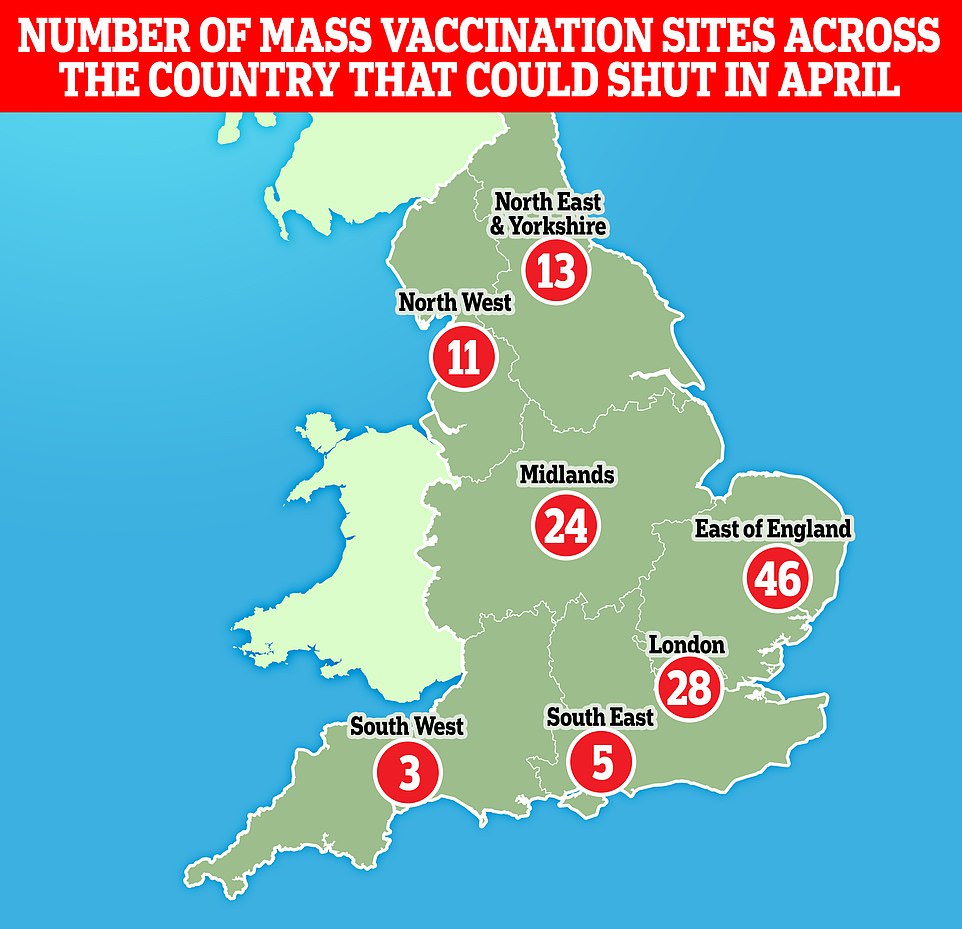
Mass coronavirus vaccination sites across the UK have announced they will close temporarily next month due to looming supply issues. Vaccine centres in Devon, Cornwall and Kent are among those to have confirmed they will ‘have to pause’ during the month-long slowdown. If the rest of the country follows suit, it could mean all 150 mass sites will shut
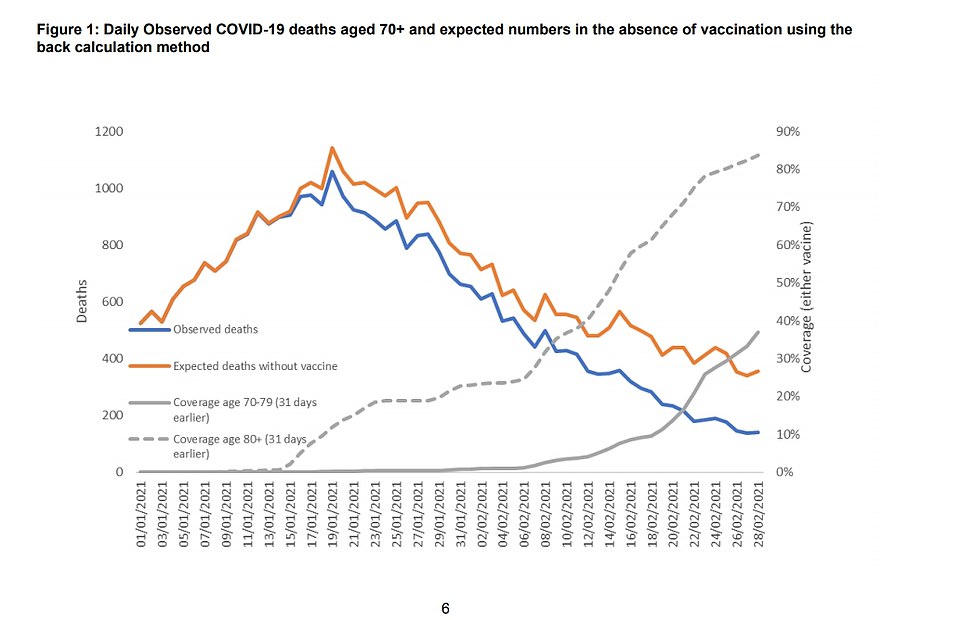
Analysis carried out by Public Health England (PHE) suggests that the COVID-19 vaccination programme prevented 6,100 deaths in those aged 70 and older in England, up to the end of February 2021
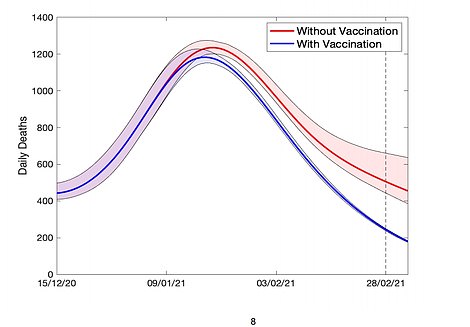
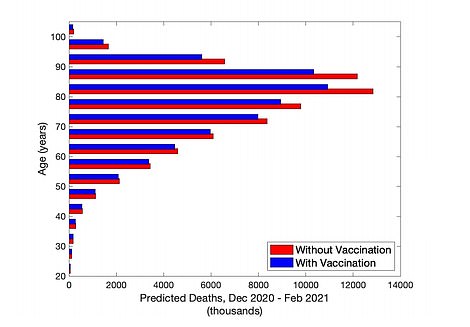
The graph show how PHE would expect deaths to fall with the lockdown alone (red) compared to with the boost of the vaccines (blue). Broken down by each age group, right
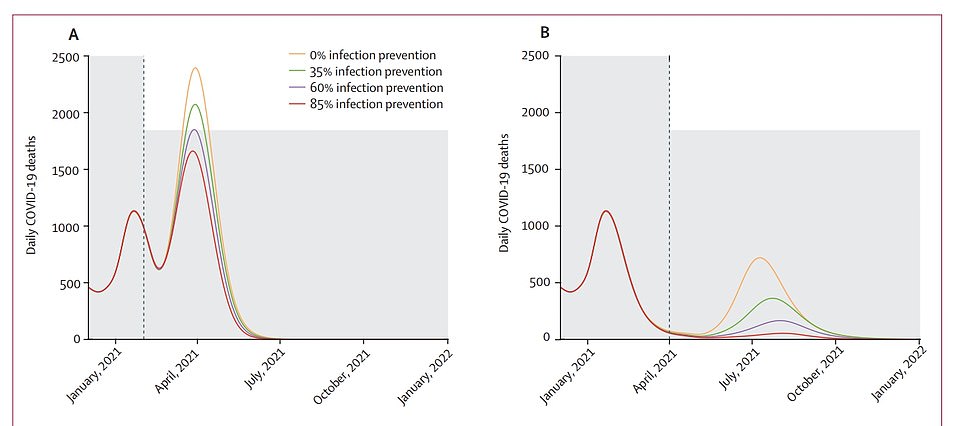
However, separate modelling by Warwick University, which feeds into SAGE, suggested there could have been an extraordinary 1,750 daily Covid deaths if Britain had lifted the majority of lockdown curbs and reverted to the rule of six and 10pm curfew in February (left). The modelling, published on March 18, suggested daily fatalities could hover at around 200 under Boris’ current lockdown plan (right). The purple line is what the researchers predict the UK’s epidemic will look like, because the vaccines have been shown to cut transmission by 60 per cent
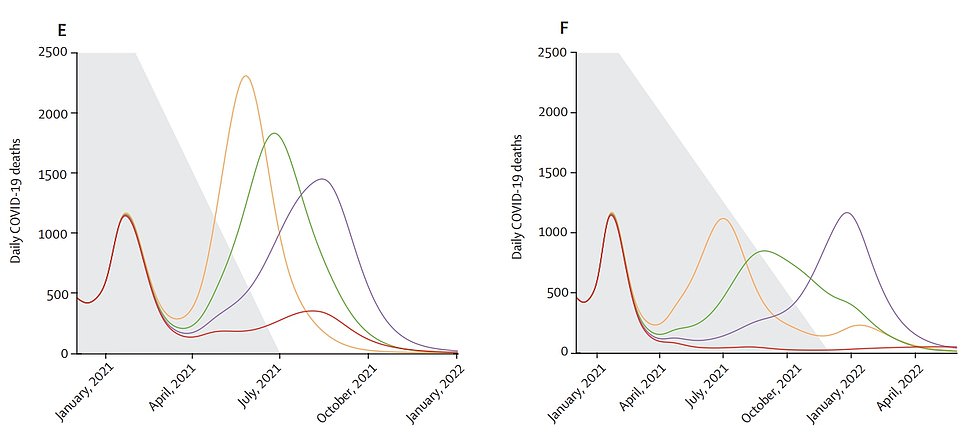
Warwick also modelled what would happen to deaths if all curbs were gradually lifted by this summer (left) or in autumn (right). Both scenarios would result in a large winter peak, according to the calculations. Lifting all curbs by July could lead to 1,500 daily deaths at the peak, while lifting them by October could result in more than 1,000. Warwick’s Dr Sam Moore, co-author of the study, has since admitted the projections were too pessimistic. He told The Telegraph: ‘Since we conducted this study, new evidence suggests there may be a higher level of protection against severe disease offered by both the Pfizer/BioNTech and Oxford/AstraZeneca vaccines than the level we assumed.’
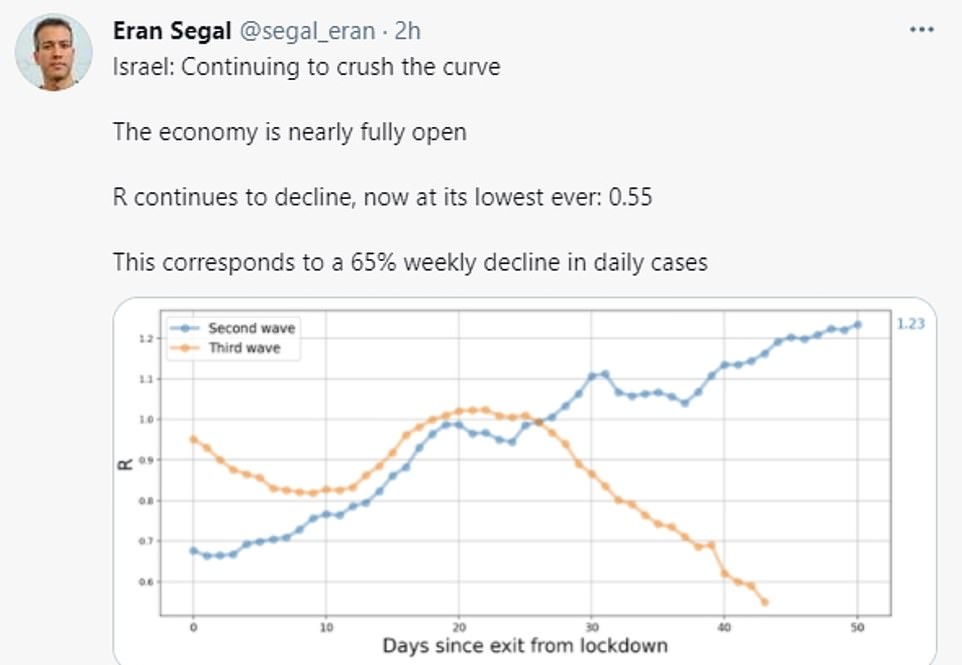
But evidence from Israel, the only country jabbing faster than Britain, shows that cases continued to plummet after came out of lockdown a month ago (orange). When Israel opened up it had roughly 50 per cent of its population vaccinated, the same stage Britain is at now. Shown in blue is the country’s infection rate after reopning from its previous shutdown last year, before the vaccines were available
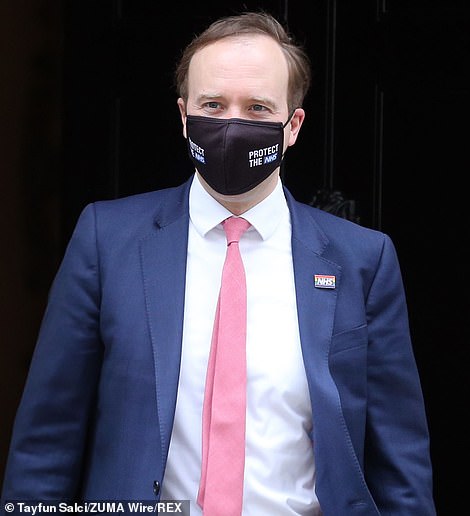
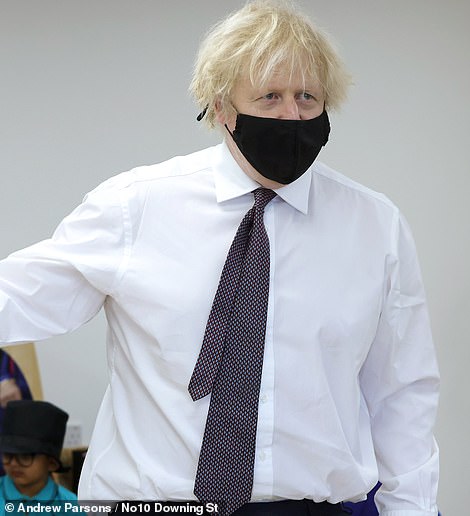
Matt Hancock today credited the coronavirus vaccines with saving at least 6,000 lives already in the UK. Meanwhile, internal Government projections have predicted Covid hospital admissions will halve by April because of the jabs – suggesting Boris’ roadmap out of lockdown is firmly on track
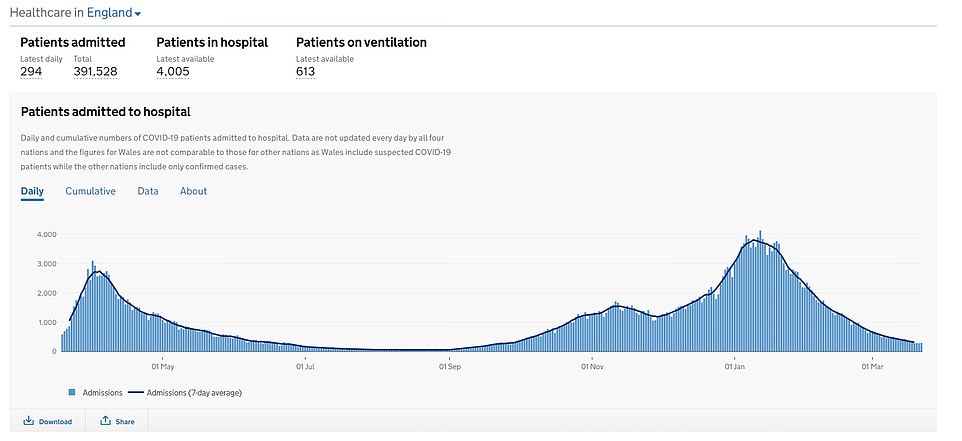
Projections from the SPI-M modelling group suggested the number of Covid patients being admitted to English hospitals is poised to halve in a fortnight, from 294 to fewer than 150
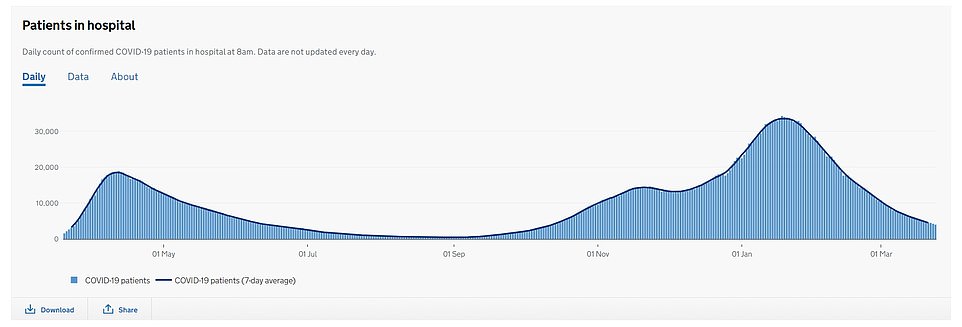
The group also projected the number of deaths to drop fourfold, from 92 to 20, early next month and the level of inpatients (shown) with the disease to plummet from 4,000 to about 2,000
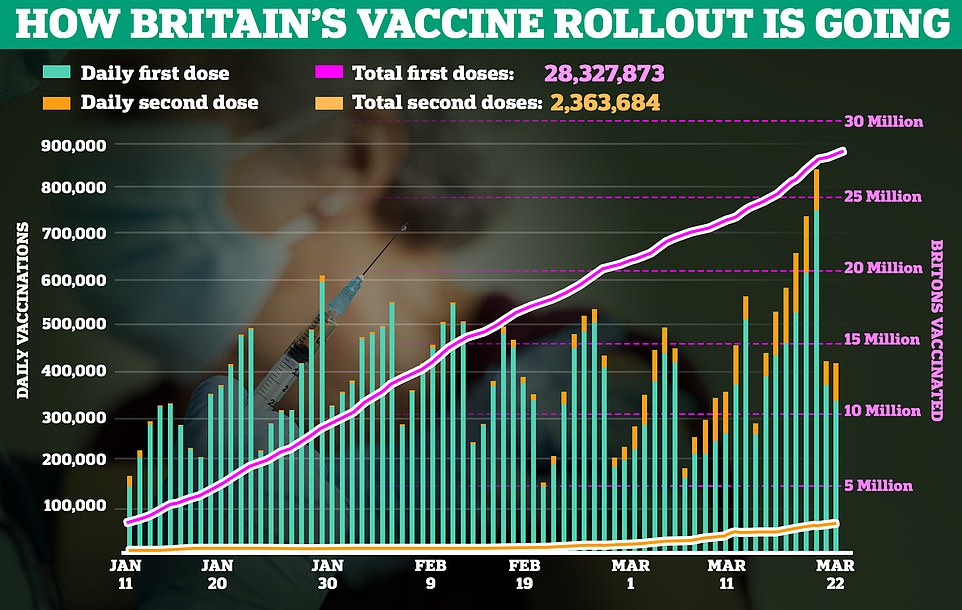
Government data up to March 23 shows 28,653,523 people have received a first vaccine dose, a rise of 325,650 on the previous day
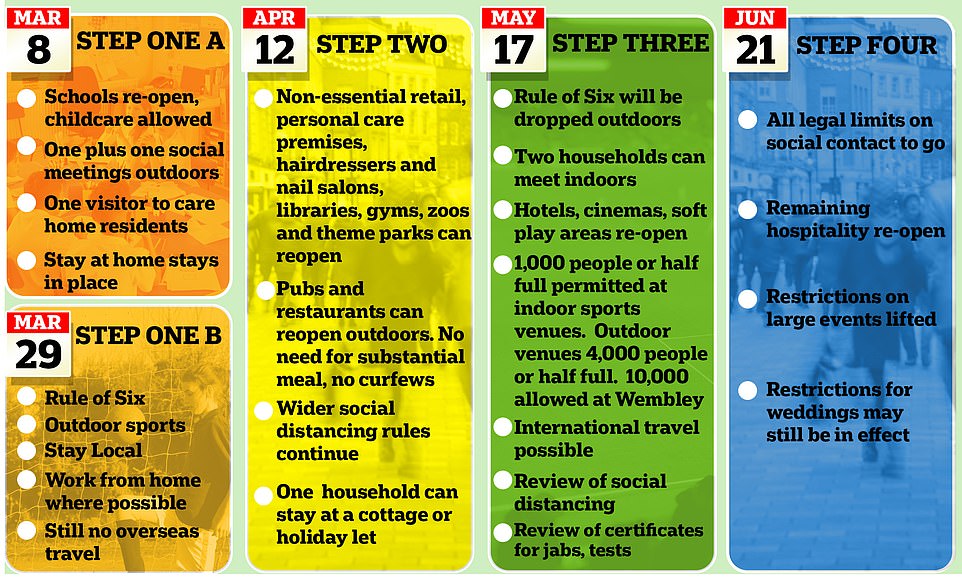
The unusually optimistic projections from No10’s experts will pile more pressure on the PM to speed up his lockdown-loosening plan
The Health Secretary expressed confidence about the UK’s ability to manage Covid-19 in the future, adding: ‘It depends what you mean by ”end”.
‘I see an end where Covid is managed more like flu: we repeatedly vaccinate, we update the vaccines according to mutations and we manage the challenges, especially around transmissions over winter.
‘I’m confident that’s where we can get to. I want to get to a position where we can have an updated vaccine in weeks or months, not a year.’
It comes as Mr Johnson tries to push through an extension of lockdown laws until the autumn, despite restrictions officially ending in June.
A hardcore of as many as 60 Conservative MPs is expected to rebel against Government plans to extend emergency powers to the end of September.
Politicians in the Covid Recovery Group (CRG) blasted the ‘significant draconian powers’ and questioned the need for them to be in place if the UK has returned to relative normal.
However, any Tory rebellion is almost certain to fail to impede the legislation, with Labour planning to back it in this evening’s Commons vote.
CRG leader Mark Harper, who believes plans to ease the lockdown ‘could safely go more quickly’, told Sky News: ‘The biggest problem today is the extension of some very significant draconian powers in the Coronavirus Act which the Government doesn’t want to extend until June, it actually wants to extend all the way into October.
‘And these are quite significant powers; they are powers, for example, for the police to detain people indefinitely and to continue having powers to shutdown events and so forth all the way through to October.
‘And I haven’t heard a single good answer about why the Government wishes to do that, given that the Prime Minister has said he wants to be out of all of our legal restrictions by June.’
The legislation for restrictions over the coming months, as the Government sets out its road map for coming out of lockdown, will see some restrictions remain in place in England until at least June 21.
There are also question marks over summer holidays taking place after that date, amid a third wave of Covid infections in mainland Europe.
But Conservative MP Steve Baker, deputy chairman of the CRG, said the vote was a ‘rare opportunity’ for MPs to ‘say no to a new way of life in a checkpoint society’.
‘I was glad to hear the Prime Minister reassure William Wragg MP at the Liaison Committee today that ‘anything that is redundant will go’ in relation to Coronavirus Act powers,’ the former minister said last night.
‘Draconian police powers under Schedule 21, which have a 100 per cent unlawful prosecution record, must be considered ‘redundant’ to say the very least.
‘I am seeking to table an amendment to the motion tomorrow asking ministers to suspend those powers. I now hope the Government can support it.’
